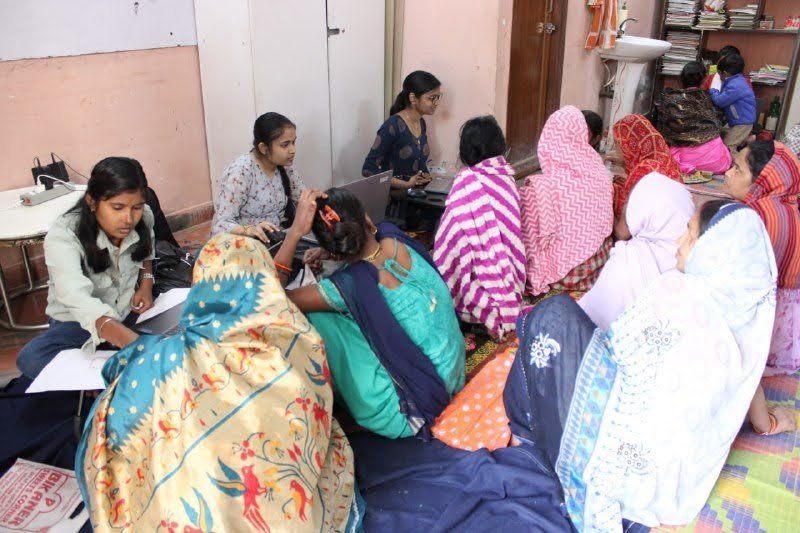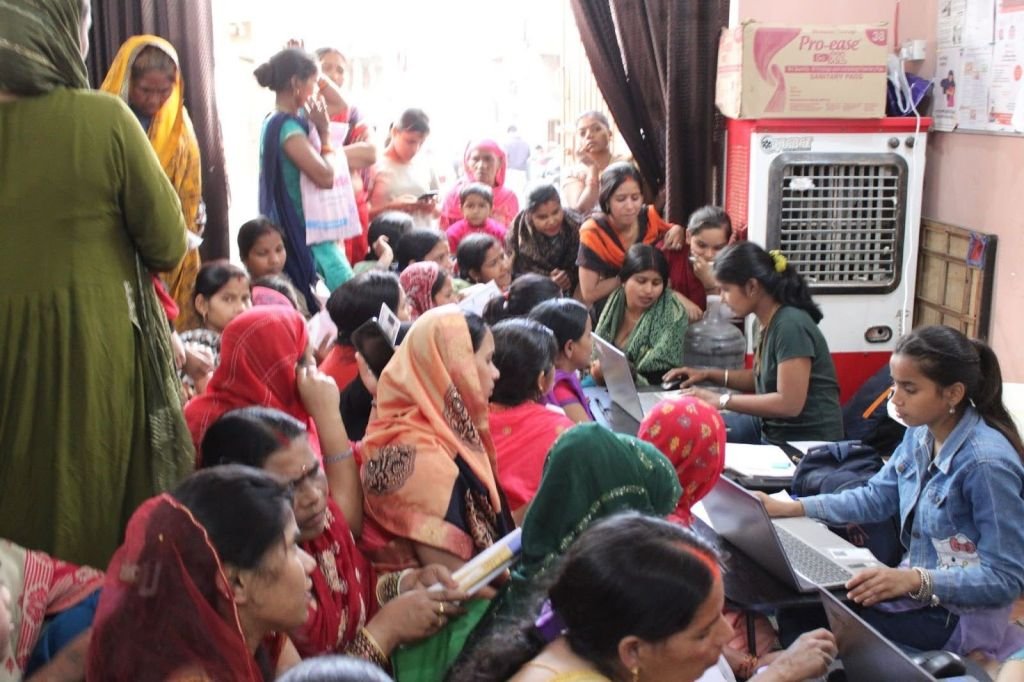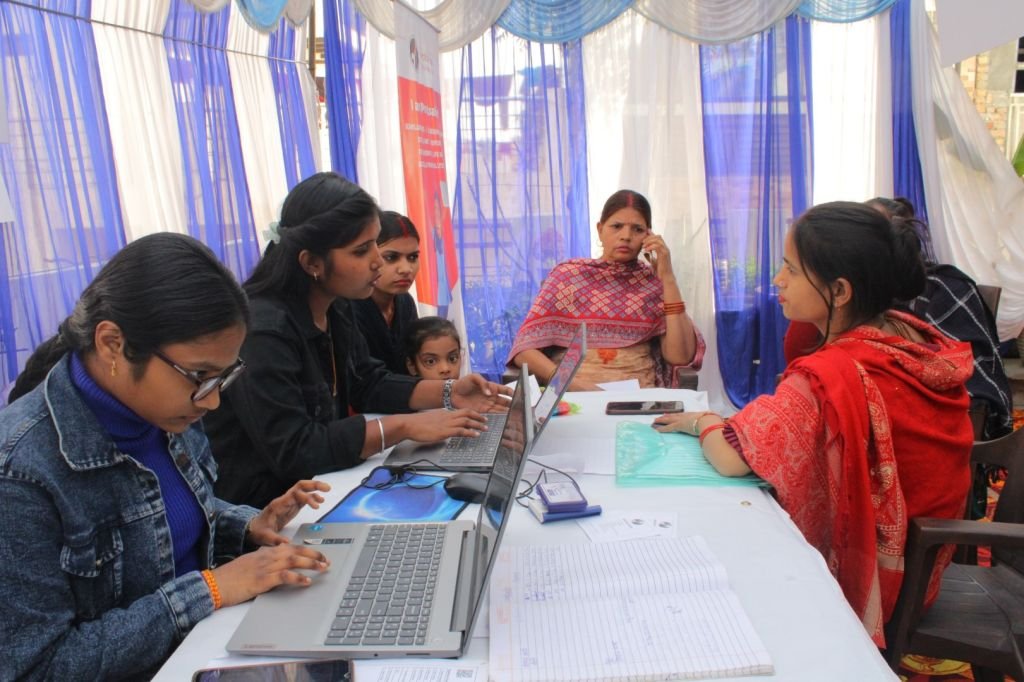
Author: Vipul Yash
“Birju came to Delhi from his village in Bihar in search of employment in 2019. He along with his wife and three (3) daughters, started living in a shanty and the couple started working as daily wage labourers at a nearby construction site. They were encouraged by a fellow labourer to get a labour card made. Initially reluctant, they did not see any merit in getting it. But later on, on the urge of a local social worker, they got their labour card made. With the onset of the COVID-19 pandemic, Birju and his family found themselves in a desperate economic strait. But by virtue of their labour card, they were able to receive various benefits provided to construction workers during the pandemic. This support proved pivotal for the family to continue their livelihood in Delhi.”

Life Profile: Construction Workers in Delhi
Destruction of old properties and construction of new ones is not an uncommon sight in New Delhi. From residential homes to government highways, the nation’s capital seems to be in a perpetual cycle of construction.
With this perpetual cycle of construction comes the perpetual need for workers. Hailing from various corners of the country, labourers migrate to Delhi, drawn by the promise of employment and sustenance provided by construction sites. Many of these labourers originate from economically deprived backgrounds, unaware of their inherent rights. This lack of awareness renders them vulnerable to exploitation, as some employers frequently overlook the “S” in ESG, neglecting their social responsibilities towards fair remuneration and conducive working conditions.
It is a widely acknowledged fact that living conditions endured by these labourers and their families fall below acceptable standards. However, due to their economic vulnerability and hence invisibility, they find themselves trapped in these circumstances with little agency to improve them. Their daughters seek opportunities around education and skilling at Protsahan grassroots centres, where discussions with these young adolescents led to reflections. Such reflections prompt us to delve into fundamental inquiries: What defines migrant labour? How social protection of parents is sine qua non for child protection? What characterizes improved conditions for this informal workforce of the country? How can the families of these children be strengthened and linked to good government schemes at a hyperlocal level?
These conversations spurred the development of a foundational and human-centred framework at Protsahan that comprised a transition from abuse, a continuum of care, and linkages with the system. This framework primarily emphasizes the fundamental needs of vulnerable children and their families – and to not look at them as separate pieces.
Labour Card: Awareness, Need & Benefits
The final part of the human-centred framework i.e. linkages with the system focuses on linking the community members with important government documents and policies. As migrant labourers, the most important document they require is the labour card issued by the Delhi government. A labour card is an identity card issued by the Delhi government’s labour department that takes care of a labourer’s safety, development, education, and security. As mentioned earlier, lack of awareness makes room for exploitation. In such a situation it becomes imperative for the government to not just provide basic protection but also social protection and upliftment for migrant labourers in Delhi. Labour card takes care of the social protection required by such families, which translates into the protection of the child. It is an attempt to bring some sense of safety and government support to the lives of unskilled workers working in the unorganised sector.
The benefits a labour card can provide are triple-fold. First, it acts as an identification of the labourers to the employer as well as government authorities. This lessens the chances of exploitative actions on the part of the employer as the worker is properly registered with the government. Second, it provides social protection like school fees and injury insurance to the labourers and their families. Incentives like school fees Third, it provides support in times of extraordinary situations. The COVID-19 pandemic made a dent in all of our lives. There were very few who were not impacted by the pandemic in one way or the other. But people from poor socio-economic backgrounds, who lived on daily wages were dealt the worst hand, labourers being one of them. As most of the construction work was shut down, they had no source of income to feed their families. During this time of distress, labour cards played a crucial role in providing finances to them for sustenance.
Governments, be it state or centre, have various policies and schemes that provide social protection to vulnerable families. These policies have the merit to positively benefit the lives of its beneficiaries. The lack of awareness amongst the potential beneficiaries becomes a roadblock. Hence, awareness building needs to be a priority for government agencies and non-profits alike.

Case Study
Sarita Devi, a 47-year-old construction worker, came to us to know if there is any government policy for her financial aid. She was concerned about her ability to continue working as it was becoming physically draining for her. Her concern was also the discontinuation of work as it happened during COVID. So when she put these questions in front of us, our social workers informed her about the importance of a labour card for a construction worker and how it can benefit her and her family. Her labour card was made, post which she is receiving every government assistance that comes with it.
Just like Sarita, many lives can be impacted in a positive manner by effectively connecting them with a government scheme. Many people may presume that the support provided is minuscule and doesn’t do much to aid the family. But what is important to realise here is that such interventions and linkages are the only route to sustained development.
“Linkages with labour card is an essential first step towards realising the rights of people working in the unorganised sector. This empowers the labourers to be assertive about their rights and not get exploited at the hands of their employers. This new-found self-respect amongst the labourers stems from the social protection they receive, which translates into child protection,” – Govind Rathod, Centre Coordinator at Protsahan India Foundation.

